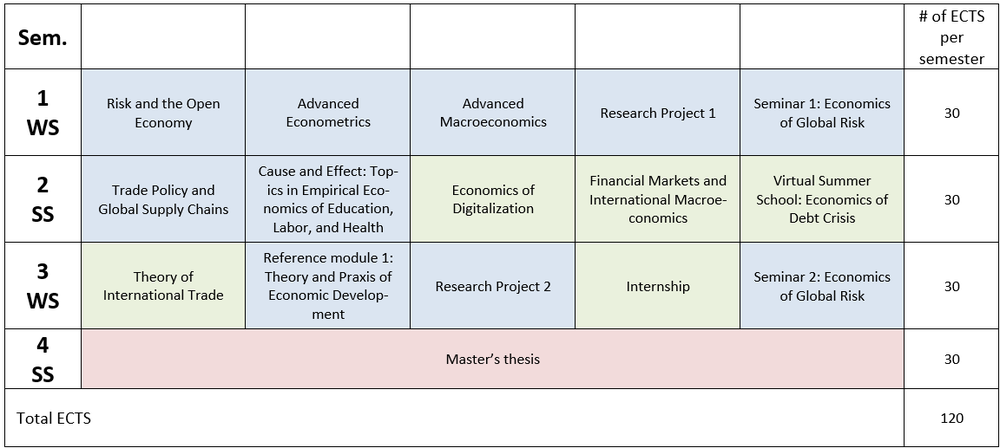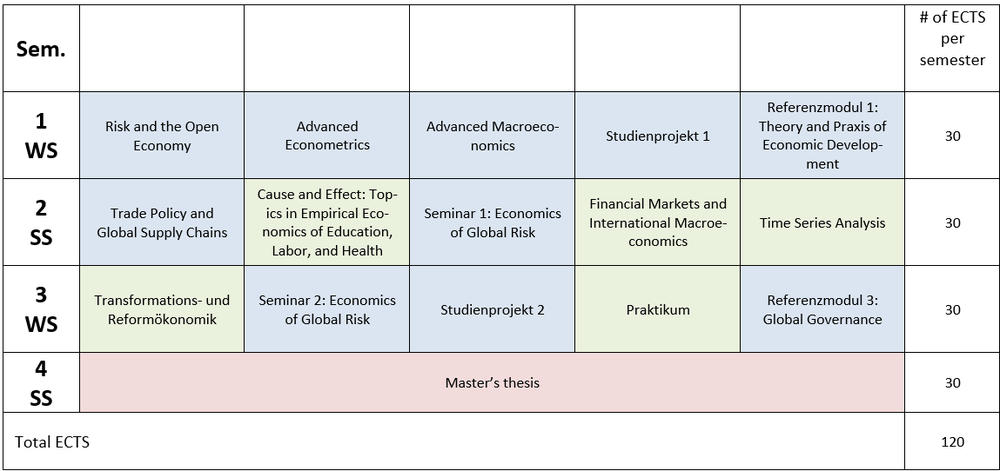Structure and Organization
Admission Requirements
- Professionally qualifying German or equivalent foreign university bachelor’s degree in economics or business studies or other bachelor's degree with a share of at least 40 credit points (ECTS) in economics and 15 credit points (ECTS) in mathematics, statistics, or econometrics.
- Proof of English skills:
- either: German university entrance qualification (demonstrated by school certificates)
- or: minimum score of 72 in TOEFL-IBT (internet-based test)
- or: minimum overall score of 6 in IELTS
- or: at least level B2 CEFR
- or: proof of a Bachelor’s degree in English.
Fees
Students do not pay any tuition fees, the university only charges semester fees and contributions each semester. You can find more information hier.
Subject
Globalized economies are exposed to globalized risks. Financial crises, climate change, wars and geopolitics, or the spread of pandemics threaten globally integrated economies. All of these disruptions are global in nature. Households, firms, and policymakers must address risks that are no longer confined to national borders.
To deal with global risks, we need thinkers and managers with a skill set that combines economics with a strong quantitative focus and knowledge from neighbouring disciplines such as international politics, development studies, and international law. This program prepares students to understand a risky world economy. With a Master's degree in Economics of Global Risk, students are well-prepared for a career in government, non-governmental organizations, multinational corporations, and research institutions.
Basic Information
- Duration of studies: 4 Semesters (120 credit points)
- Academic degree: Master of Science in Economics of Global Risk
- Commencement of Studies: Winter semester (October) and summer semester (April)
- Language of instruction: English, elective moduls in German can be taken voluntarily
Structure
Major (60 ECTS)
7 Compulsory modules
(see the list of compulsory modules in Major below)
3 Compulsory elective modules
(see the list of compulsory elective modules in Major below)
Minor (30 ECTS)
Compulsory elective modules
(see both the list of compulsory elective modules in Major, and the list of compulsory elective Modules in Minor below)
Free elective modules
2 modules from other disciplines and cross-sectional areas such as Gender & Diversity, Business English, or internship, or additional modules from the fields of general Economics and/or Business Administration.
Master's Thesis (30 ECTS)
Supervised by one of the economics professorships at our department.
The structure of the program is defined by the study and exam regulation, containing detailed descriptions of the contents and goals of individual modules as well as definitions of the type of and requirements for individual assessments in the modules and the final examination for the program. These regulations also define the available credits for each module and the required hours for the completion of the program.
The Master of Science in Economics of Global Risk program comprises three study blocks, each of which consists of different modules (see below). In addition to the compulsory 120 ECTS, you can take optional extra courses amounting to 18 ECTS.
In the first three semesters you will take five modules of 6 ECTS each. In the fourth semester, you will write your thesis (30 ECTS). However, you can be flexible with your program in terms of the duration of your studies, as you have a total of 8 semesters to complete your degree.
Major (1st-3rd semester)
- In addition to the compulsory modules "Trade Policy and Global Supply Chains", "Risk and Open Economy" and "Advanced Econometrics", students must complete two research projects and two seminars within the Economics of Global Risk area.
- During the compulsory seminars students will engage with important contemporary topics that are foundational to the degree program.
- The two compulsory research projects may involve participating in ongoing research or learning to use software applications.
- Students also have a wide choice of three compulsory elective modules. This allows you to set individual priorities and prepare yourself optimally for your career entry.
Please find the lists of compulsory and compulsory elective modules in Major below.
Compulsory modules in Major (42 CP)
| Module Code | Module Title | Chair | Semester | Language | Eligible in Major | Eligible in Minor |
|---|---|---|---|---|---|---|
|
02-VWL:MSc-V3-2 |
Trade Policy and Global Supply Chains |
VWL III |
summer |
English |
Compulsory module |
No |
|
02-VWL:MSc-V5-3 |
Risk and the Open Economy |
VWL V |
winter |
English |
Compulsory module |
No |
|
02-VWL/BWL:MSc-St-1 |
Advanced Econometrics |
VWL VII |
winter |
English |
Compulsory module |
No |
|
02-EGR:MSc-Seminar-1 |
Seminar 1: Economics of Global Risk |
All EGR-Chairs |
winter/summer |
English |
Compulsory module |
No |
|
02-EGR:MSc-Seminar-2 |
Seminar 2: Economics of Global Risk |
Alle EGR-Chairs |
winter/summer |
English |
Compulsory module |
No |
|
02-EGR:MSc-Proj-1 |
Research Project 1 (EGR) |
Alle EGR-Chairs |
winter/summer |
English |
Compulsory module |
No |
|
02-EGR:MSc-Proj-2 |
Research Project 2 (EGR) |
Alle EGR-Chairs |
winter/summer |
English |
Compulsory module |
No |
Compulsory elective modules in Major (18 CP)
| Module Code | Module Title | Chair | Semester | Language | Eligible in Major | Eligible in Minor |
|---|---|---|---|---|---|---|
|
02-VWL:MSc-V1-1 |
Economics of Regulation |
VWL I |
summer |
English |
Yes |
Yes |
|
02-VWL:MSc-V3-1 |
Theory of International Trade |
VWL III |
winter |
English |
Yes |
Yes |
|
02-VWL:MSc-V3-4 |
Virtual Summer School: Current Issues in Economics |
VWL III |
summer |
English |
Yes |
Yes |
|
02-VWL:MSc-V4-2 |
Transformations- und Reformökonomik |
VWL IV |
winter |
German |
Yes |
Yes |
|
02-VWL:MSc-V5-1 |
Financial Markets and International Macroeconomics |
VWL V |
summer |
English |
Yes |
Yes |
|
02-VWL/BWL:MSc-St-2 |
Zeitreihenökonometrie und computergestützte Verfahren |
VWL VII |
summer |
German |
Yes |
Yes |
|
02-VWL/BWL:MSc-V9-1 |
Economics of Digitalisation |
VWL IX |
summer |
English |
Yes |
Yes |
|
02-VWL/BWL:MSc-V10-1 |
Cause and Effect: Topics in Empirical Economics of Education, Labor, and Health |
VWL X |
summer |
English |
Yes |
Yes |
|
02-VWL-MSc-Dekanat-1 |
Staatsverschuldung und Klimapolitik |
Dekanat |
irregular |
German |
Yes |
Yes |
|
02-EGR:MSc-Seminar-3 |
Seminar 3: Economics of Global Risk |
Alle EGR-Professuren |
winter/summer |
English |
Yes |
Yes |
|
02-BWL:MSc-F-B5-1 |
Risikomanagement |
BWL V |
summer |
German |
Yes |
Yes |
|
MK-067-EN-DI |
Theory and Practice of Economic Development |
FB 09 |
winter |
English |
Yes |
Yes |
|
MP-208-EN-DI |
Concepts of Ecological Economics |
FB 09 |
winter/summer |
English |
Yes |
Yes |
|
03-MA DG-B-4 |
Global Governance |
FB 03 |
summer |
German/English |
Yes |
Yes |
|
- |
International Migration Law |
FB 01 |
irregular |
English |
Yes |
Yes |
Minor (1st-3rd semester)
- In the Minor, students can choose modules from the list of compulsory elective modules in the Major (see the list above) and from other areas of business studies and economics (General Business Studies and Economics) (see the list below).
- The students also have the opportunity to enroll in master's modules from other disciplines amounting to maximum 12 ECTS. Alternatively, an internship equivalent to 6 ECTS can be completed, or other modules on cross-sectional topics (see the list below) such as Gender & Diversity or Business English can be taken. Within these 12 ECTS, ungraded achievements can also be included.
Economics
- Industrial Organization (winter)
- Economics of Innovation (summer)
- Summer School in Economics (summer)
- Advanced Macroeconomics (winter)
- Mikroökonomik und Spieltheorie (winter)
- Verhaltensökonomik (summer)
- Grundlagenprobleme der angewandten Ökonomie (winter+summer)
Business Studies
- Product Management (winter)
- Business Development (summer)
- Advanced Issues in Marketing and Sales (winter)
- Advanced Strategic Management (winter)
- Mergers and Acquisitions (summer)
- Advanced Exercises in Strategic and International Management (summer)
- Advanced Controlling (summer)
- Cases in Consulting and Management Accounting (summer)
- Investitions- und Nachhaltigkeitscontrolling (winter)
- Corporate Functions and Management Accounting (summer)
- Behavioral Finance (winter)
- Versicherungsmanagement (irrgeular)
- Applied Portfolio Management and Sustainability (summer)
- Applied Corporate Finance (winter)
- Sustainable Business – Strategy, Governance & Finance (summer)
- Auditing & Consulting (summer)
- Spezialfragen des Financial Accounting & Auditing: Einzelabschluss (summer)
- Spezialfragen des Financial Accounting & Auditing: Konzernabschluss (winter)
- Konzernberichterstattung & Sustainability Accounting (winter)
- Empirische Managementforschung (winter)
- Organization Theory and Design (summer)
- Advanced Exercises in Leadership and Human Resource Management (winter)
- Advanced Exercises in Management Research Methods (summer)
- Systems Engineering (winter)
- Digital Business (summer)
- Managing the Innovation Process (summer)
- Creativity and Entrepreneurship (winter)
- Text Mining (winter)
- Design und Analyse von Experimenten in den Wirtschaftswissenschaften (winter)
- Data Science for Consumer Behavior (summer)
- Internationale Unternehmensbesteuerung und Steuerstrukturierung (summer)
- Besteuerung von Personen- und Kapitalgesellschaften (summer)
- Umsatzsteuerrecht und Zollrecht (summer)
- Besteuerung natürlicher Personen (winter)
Cross-sectional modules
- Business Ethics (winter)
- Rhetoric for Managers (summer)
- Praktikum 6 CP (winter+summer)
- Querschnitts-Vertiefungsmodul: Gender und Diversity Management
Master's Thesis (4th semester)
- You will write your thesis at one of the professorships in the area of Economics of Global Risk.
- You have six months to work on your thesis.
- The thesis may also be written as practical work after consultation with the supervising professor.
Optional Extra Credits (1st-4th Semester)
Exemplary Study Plans
An examplary study plan entirely in English:


An examplary study plan in English and German:


Modules
- Our modules are delivered by various professorships, with each module typically awarding 6 ECTS.
- You can find all available modules in our electronic course catalog (elektronisches Vorlesungsverzeichnis (eVV))
- Regular and Advanced Modules: Alongside our standard modules, we also provide advanced modules, identified by the "extra" label in the module code. Details of these advanced modules can be found in eVV under the sections "Advanced Topics in Business Administration, Economics, or Interdisciplinary Areas."
- Here you can find the course catalogue in English.
Academic Degree
The Faculty of Economics and Business Studies at Justus Liebig University Giessen (JLU) awards the degree of Master of Science (M.Sc.) in Economics of Global Risk upon successful completion of the program "Master of Science in Economics of Global Risk."
Application
To apply for the study programme, please go to the application portal
Further Information and support
